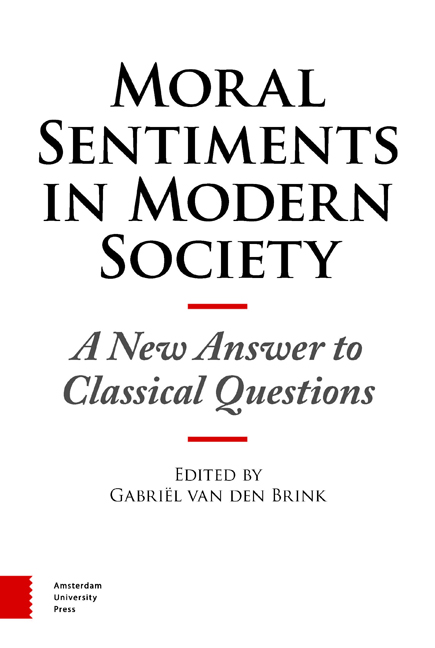Book contents
1 - Research Questions and Theoretical Framework
Published online by Cambridge University Press: 02 February 2021
Summary
Although our research into the meaning of moral sentiments in modern society is largely empirical, we first offer the reader some theoretical considerations. We begin with an explanation of the two concepts that together make up the title of our book. What do we mean by ‘moral sentiments’? And what do we mean by such a generic term as ‘modern society’? We are aware that a proper treatment of these two concepts would never fit into one chapter. Entire libraries could be filled with books dedicated to these subjects, and if one were to consult everything, there would be little time left over for anything else. We have therefore chosen a method that is deliberately selective. For the first concept, we will examine the theory that Adam Smith developed in the middle of the eighteenth century. With regard to the second concept, we make use of the research that we have conducted over the last 30 years and that led in 2007 to our own theory of modernisation. It might be good to forewarn readers that combining these two perspectives does not result in a conceptual synthesis. Ideas about moral sentiments and ideas about modernity are in many ways diametrically opposed. There are no areas where the tension between the two perspectives are definitively resolved, and this is precisely the crux of our research. To make this plausible, a more historically oriented consideration is required, which is presented in chapter 2. This, of course, does not relieve us of the duty to develop a consistent line of thought here.
This line of thought is structured in the following manner. We begin with a summary of Adam Smith's analysis of moral sentiments (section 1). We then explain how he sees the relationship between morality and other facets of social life (section 2). This brings us to the question of how these ideas can be reconciled with certain insights about the modern economy. Smith is famous largely because he was the first to understand the laws of the free market, an insight that established economics as a scientific discipline (section 3). In the section that follows, we expand on our second concept, modern society. We explain what we mean by modernisation (section 4). Then we discuss three features that we believe form the core of modern life (section 5). As an extension of this point, we describe a few trends that interact with one another during the modernisation process but
- Type
- Chapter
- Information
- Moral Sentiments in Modern SocietyA New Answer to Classical Questions, pp. 25 - 64Publisher: Amsterdam University PressPrint publication year: 2016



